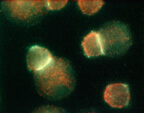Autoimmune Disease Research at the Johns Hopkins Institute for Basic Biomedical Sciences

Autoimmune disease results from an overactive immune system that attacks its own tissues instead of fighting off pathogens. Researchers at the Institute for Basic Biomedical Sciences (IBBS) are investigating the cause and exploring new treatments for autoimmune diseases.
Autoimmunity causes more than 80 different diseases, their symptoms varying widely depending on the tissues affected. According to the National Institutes of Health, approximately five to eight percent of the U.S. population, the majority being women, suffers from an autoimmune disorder. Autoimmune diseases include disorders such as:
- Type 1 diabetes in which the immune system damages the insulin-producing cells in the pancreas
- Rheumatoid arthritis where the immune system harms the joints
- Hashimoto’s thyroiditis which impairs the thyroid gland and, as a result, metabolism.
In serious cases, global immune suppressing drugs are used to restrain the body’s immune response, preventing it from doing further harm. Unfortunately, immunosuppressants render people more susceptible to infections.
IBBS researchers are taking measures to understand, on the molecular level, what goes wrong when the body’s defense system battles that which it is supposed to protect.
Joel Pomerantz of Biological Chemistry studies how T cells and B cells, another type of white blood cell, respond to infections by making the decision to grow, divide, recruit other immune cells to the fight or commit suicide in certain instances, such as when the cells are no longer needed after a subdued infection or when the cells mistakenly react to the body’s own cells. By understanding the intricacies that occur in the cellular machinery of white blood cells during this decision-making process, Pomerantz’s lab hopes to further understand what goes wrong in autoimmunity and certain types of cancers.
